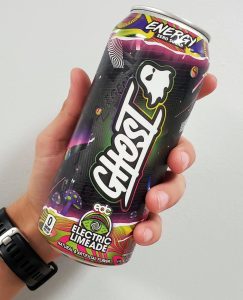Energy drinks are a doctor’s nightmare. They’ll give a person a blood clot after a week, and if they don’t have one, it means they’ll have a heart attack before they graduate college.
Right?
You’ve often heard these ominous warnings whenever you want to try an energy drink, however, most won’t delve into how or why energy drinks are such a lethal concoction.
The reason behind this is much more complicated than most realize.
Of the students who took the energy drink survey sent out to Dallastown students, about 40% said they drink coffee. Most assume that coffee is far healthier for the heart than an energy drink, but they’ve already miscalculated.
One 8 oz. cup of coffee has about 95 mg of caffeine, about the same amount as an energy drink. Drinking more than 1 cup is common; at least 30% of Dallastown coffee consumers said they do this daily.
Senior Josh Bell even prefers energy drinks to coffee, stating, “Coffee drinks are inferior and less effective than energy drinks such as Ghost and Monster. This is due to the synthetic and natural combination of ingredients that do much more to energize someone throughout the day.”
Some people aren’t used to the quick shot of energy from energy drinks that Bell speaks so highly of, and this is likely due to their caffeine tolerance.
The most accurate way of knowing a person’s caffeine maximum is to divide their body weight by 2.2 and then multiply it by 3. For example, a 146-pound student’s maximum is 200 mg.
Very few energy drinks have above 200 mg (Reign is a popular exception), by only drinking one energy drink a day, most should be quite safe regarding caffeine intake.
Another issue that people will point to on energy drink labels is sugar.
Sugar is popular in many energy drinks, and this is an issue, there’s no going around it. However, the zero sugar options can also remedy this, by simply removing sugar.
Although some are wary of the artificial sweetener sucralose in them, “scientists haven’t found any direct negative health effects in people who consume sucralose long-term”, and it is FDA-approved.
Even doctors such as Michael Ackerman, a cardiologist say, “‘Consumption is at all-time-high levels, and people aren’t dropping like flies left and right,’ he says. ‘The absolute risk, if your heart is healthy, is super, super, super low.'”
Now that the minimal health risks of having most energy drinks are established, it’s important to point out some that are toeing the line.
Monster, for example, has high amounts of ingredients that, in low amounts are fine, but in high amounts are not, and do not disclose how much of said ingredient there is.
Monster also has ingredients common in other drinks such as panax ginseng, which is in Rockstar. It also shares the ingredient erythritol with Alani Nu, which has been linked to blood clots and heart attacks. On the other hand, however, it is worth noting that erythritol is the only sketchy ingredient in Alani.
Thankfully, students are vaguely aware of these risks in specific energy drinks and will prefer other brands.
“I adore Celsius, I have been drinking it for almost a year at this point. I think it’s better than a lot of the alternatives out there (I.e. Red Bull or Monster.)” says Senior Bryce Keller.
Celsius is sold in the school cafe, which may be why nearly half of the people who drank energy drinks reported liking, and it’s much better in terms of their ingredients.
They have zero sugar and a clean ingredients list. Their only issue is their biotin, which in high amounts can damage the thyroid, which is responsible for metabolism.
This contrasts with Celsius’ claims to improve metabolism, and even burn body fat. In the bottom corner of the can a disclaimer for this statement sits.
“Celsius helps maintain the body’s metabolic function. Celsius alone does not produce weight loss in the absence of a healthy diet and moderate exercise.”
What does that mean? It means Celsius lovers will only see weight loss results if they’re living a lifestyle that would produce those results, regardless of whether or not they drink Celsius.
Despite these claims, Celsius is probably one of the most healthy drinks overall, but what about an energy drink before a sports performance or a gym session?
Welcome to the realm of pre-workout energy, with options such as C4 and Ghost. They have different focuses and ingredients than competitors like Celsius, which focuses on health and weight loss, or Monster, Bang, and Redbull, which specializes in pure energy and taste.

C4 and Ghost do their best to promote muscle recovery, and performance, with C4 claiming to be tested and approved by collegiate athletes.
The drinks even contain compounds like Astragin, L-carnitine, and L-tartrate, which boast better muscular recovery and improved athletic performance and output.
Even if some of their claims aren’t fully proven yet, the possibility still exists that C4 or Ghost could improve athletic performance, which is likely why energy drinks are banned as a pre-game stimulant in the NCAA.
Junior Andrew Guerrini seconds this claim, saying that the benefit of drinking energy drinks is a “better workout performance.”
Overall, it’s essential to understand what is in the drinks you’re consuming. Although some energy drinks are ok to have once a day, some such as Monster should be avoided. If students need an energy drink, check the label before choosing one.
A well-informed consumer is a smart one.